- Home
- Natalie Babbitt
Goody Hall Page 2
Goody Hall Read online
Page 2
There was a moment of silence. “Hmm,” said Hercules Feltwright to himself. Then he cleared his throat. “Excuse me,” he said aloud, “but is Willet’s father at home? Shouldn’t I meet him too?”
Mrs. Goody’s face changed. “Midas Goody is out there,” she said abruptly, pointing across the lawn. “In the tomb beyond the hedge. He’s dead.”
“Dear me! I’m very sorry!” said Hercules.
“Don’t mention it,” said Mrs. Goody in a cold voice. “Don’t mention it ever again. He’s dead and that’s all there is to it.” Then she gathered the skirts of her dressing gown around her, and her first, softer voice returned. “Go and get your satchel, Mr. Feltwright,” she said. “I’m glad you’ve come.” And she turned and disappeared inside the beautiful house.
Chapter 3
It’s important to understand that Hercules Feltwright did not believe he was a hero like the mythological Hercules for whom he was named. Heroes are larger than life, and muscular, and brave as lions—or so we like to picture them—while Hercules Feltwright was tall and thin and rather stringy, and his courage was not at all the lion kind. However, Hercules Feltwright, son of a hatter and descendant of a long line of hatters, had been reminded time and time again of certain similarities between things that happened to him and things that had happened to the first Hercules in all the old stories. Only coincidences, to be sure, but Hercules Feltwright resented them just the same because he didn’t want to be like the first Hercules, in spite of the fact that his mother had given him the name with that very hope in her heart—a hero for a son!—as if the name alone could make it come true. And he didn’t want to be a hatter, either, when it came to that, in spite of the fact that his father had that very hope in his heart—a hatter for a son!—as if birth into the family automatically gave him a passion for the trade.
Hercules Feltwright wished instead to be his own true self, which is the best wish of all. But as long as he stayed at home, it was a difficult wish to realize. He was trained, of course, to be a hatter. His father trained him. And as luck would have it, he turned out to be rather good at it. His father was not surprised. After all, wasn’t the boy a Feltwright? But Hercules was surprised, and more than a little discouraged. And then, in addition, there were the things that kept happening to him which his mother insisted on comparing to the things that had happened to the first Hercules.
For instance, when he was a baby a neighbor’s child put an earthworm into his cradle and he rolled over on it in his sleep and mashed it flat. His mother was overjoyed. Hadn’t the first Hercules killed a crawling thing in his cradle when he was only a baby? Yes, but in the case of the first Hercules the crawling thing was a large poisonous snake and the infant strangled it with his bare hands! Never mind that. There may have been small differences here and there, but it was still the same thing in general, she reasoned; and it was a sign—a hero for a son!—a very promising sign.
There were other coincidences. There was the time when a neighborhood cat named Neemie went mad. Hercules, then a boy of eight, caught it and killed it after it had terrorized the village for a week. There! Didn’t that prove it again? Here was the first Hercules once more, gone out to capture the ferocious Nemean Lion for the first of his Twelve Labors. Wasn’t a lion nothing but a cat when you came right down to it? Why, the names were the same, even, or almost, anyway. Mrs. Feltwright was ecstatic. She insisted that her son keep the cat’s skin for a trophy. It wasn’t nearly large enough to wear, as the first Hercules had worn his lion’s skin, but it was a symbol just the same.
And then, most recently, there was the time when Mrs. Feltwright sent her son to a farm in the country to buy a sackful of those good big yellow apples. And all the time she kept remembering how the first Hercules was sent, for his eleventh Labor, to fetch the Golden Apples of the Hesperides. When Hercules Feltwright returned with a bulging sack, he mentioned that on the way he had come across a man tied up in a cornfield like a scarecrow, with a lot of irritating crows perching on his shoulders. He had chased the crows away and set the man free. Turning pale, his mother begged for details. Well, it seemed that the fellow was a tutor to a rich man’s children and was being punished for teaching them how to build a fire. At this, Mrs. Feltwright fainted dead away and, when revived, could talk of nothing else for days but the story of Prometheus and how the first Hercules had set him free from the rock to which he had been chained for bringing the secret of fire to mortals. An interesting comparison, no use denying that, but nothing more than a comparison, and the end of it was that Hercules Feltwright grew very weary. He left home at the age of seventeen and he went out into the world to find his own way, whatever that might turn out to be.
His father was sure that Hercules would come to his senses and return to hats and home someday, so he wasn’t too upset. But Mrs. Feltwright was very disappointed because she knew what the last of the Twelve Labors held in store: a descent to the Gates of Hell, nothing less, and a dangerous encounter with the terrible three-headed dog, Cerberus, who stood guard there. She was utterly convinced that some form of this horror awaited her son and she wanted to be there when he emerged triumphant, in order to make comparisons.
But it was not to be: Hercules Feltwright had gone away and was loose in the world, traveling about with a troupe of touring players, for he had decided that the practical way to accomplish his ends was to become an actor. “That way,” he reasoned, “I can try on as many different selves as possible and choose the one that seems to be the best and most comfortable fit.” And this is exactly how it worked out. He ranged far and wide with the troupe for a number of years, acting first in one role and then in another, and at last, after a long tour as a wise old schoolmaster in one of the plays, he was able to decide, with the simple joy that all right decisions bring, that the only and perfect thing for him to be was a teacher. “Here” (he had quoted, or rather misquoted, from the play)
“Shall I, shy schoolmaster, make me more prophet
Than ever princes can, and have more time
For saner hours, and tutor what I care for.”
And so, with a new kind of confidence, he left the troupe of actors and wandered off, a tall, stringy, baggy young man wearing the rather peculiar clothes he had come to feel at home in, and beardless in an age of beards because he liked it that way; and he came at last, at the ripe old age of twenty-five, to Goody Hall.
Chapter 4
Mrs. Goody went away to the city in the middle of the morning, and within minutes, as so often happens when the head of the house goes off, the atmosphere at Goody Hall relaxed a little. But only a little. The house itself commanded a certain formality, and Mrs. Tidings seemed determined to see that no one lost sight of the fact. Serving the meal at lunchtime, she tramped in and out of the elegant dining room with its filmy cloth and sparkling chandelier, and she was like nothing so much as an understudy who is finally getting a chance to take over the starring role. Or at least that is what Hercules Feltwright thought as he watched her. And she, of course, watched him and had her own thoughts, none of them good if you went by her expression. However, she spoke only to Willet, who slumped in lonely magnificence at one end of the shining table while Hercules had to make do halfway down one side.
Not that he would have called it “making do,” however, for he was quite overcome by his surroundings, though Mrs. Tidings didn’t seem to notice this. She placed things in front of him without comment, and after a while he relaxed a little and was able to eat without being afraid he would swallow crooked and disgrace himself by choking to death.
“Your mother’s gone off to the city again, I see, Master Willet,” Mrs. Tidings observed in an encouraging tone as she brought around the soup.
“Yes,” said Willet, testing his bowlful and pushing it away. (Hercules, on the other hand, tried his and, like Goldilocks, found it just right and ate it all up.)
“She visits all the fancy shops, I suppose,” said Mrs. Tidings idly on her next trip round with
a platter of fish.
“Yes,” said Willet, “I suppose she does.”
Beets and boiled potatoes came next and with these Mrs. Tidings offered another pointed observation: “She never buys anything in those fancy shops, though.”
But Willet only said, “No, I guess not,” and Mrs. Tidings, muttering something about clams, was forced to retire to the kitchen.
She made the most of her last appearance. She came in bearing the pudding like a bribe and spooned out a large helping for Willet, which she then anointed with cream and held up just out of his reach. “I can’t understand why a person would go all the way to the city twice a year and always come back empty-handed,” she said, looking fondly at the pudding.
“It’s strange, all right,” said Willet. “I’ll have that pudding now.” And of course she had to give it to him.
Afterward, Willet and Hercules went outside and sat on the lawn beside the iron stag, where the afternoon sun, slanting down through the leaves of the well-mannered wood, strewed everything with golden blobs of trembling light. Across the grass, on the other side of the house where the garden lay, an old man in shabby clothes knelt with a basket at his side, pulling weeds slowly and carefully. From his trouser pocket a bright red handkerchief dangled like a warning flag and from time to time he would haul it out and mop at the back of his neck.
“That’s the gardener,” Willet explained. “His name is Alfresco Rom. And he’s got a daughter named Alfreida. Hey there, Alfresco!” he called. “How are the weeds today?”
The old man turned his head and looked at them. His wrinkled face, burned brown by the sun and furnished with a large, shaggy moustache, was set in a sour and permanent frown which as much as said that, no matter what you were doing, you were a lazy good-for-nothing and he wished you would leave him alone. He scowled at them for a moment without speaking and then he tossed his tools into his basket, stood up, and stalked off out of sight behind the house.
“You must have made him angry!” said Hercules.
“Never mind,” said Willet. “He’s always like that, no matter what you say to him. I like him, though. He gives me worms sometimes.”
“Oh!” said Hercules. “That’s all right then. But you’d think it would be hard to be cross on a day like this.” He sighed contentedly and stretched out on his back in the grass with his eyes closed. A circle of sunlight wobbled on his cheek and a passing bee paused hopefully for an instant above his nose—was this some strange new variety of flower?—and then, seeing its mistake, buzzed away in disgust.
Willet Goody chewed on a blade of grass and watched his new tutor with interest. “That bee was going to sting you,” he remarked.
“Oh, I don’t think so,” said Hercules comfortably. He began to hum under his breath, waving one hand lazily, and then the hum opened up into the song he had been singing earlier on the road:
“Where the sea bucks, there buck I.
In a proud ship’s bell I lie.
Dum da de dum, de dum dum,
Dum da dum, I forget this part,
Mariner, mariner shall I live now,
Under the mosses that hang on the prow.”
“That’s a silly song,” said Willet when it was over. “It doesn’t make any sense!”
“Certainly it makes sense,” Hercules objected. “I learned it in a play. A wonderful play about a shipwreck.”
“Oh!” said Willet. “You were in a play once?”
“Once and then some,” said Hercules. “I was an actor for a long while. Traveled all over with a troupe of touring players.” He sat up and leaned his elbows on his knees. “They let me take all kinds of parts. Princes, fools, wise old men. I enjoyed it very much.”
“Do some!” Willet commanded. “Do a prince!”
Hercules scratched his head. “Well, let’s see now. I always did have trouble remembering lines, but I think I could piece together one prince part. It goes something like this.” He stood up and, laying a hand on his heart, threw back his head and bellowed:
“O! that this cuckoo’s stolid vest would moult,
Yaw, and revolve itself into a smew!
Or that the ever-laughing had not set
His gannet ’gainst well water.
Fie on’t! O fie! ’tis an unguarded weed
That sows to greed; things lank in nomenclature
Profess it clearly.”
On the side of the house facing them, a window flew open and Mrs. Tidings poked her head out. “Let up on the racket, for the Lord’s sake,” she cried. “Can’t hear myself think in here.” Then the window slammed shut again.
“Your housekeeper doesn’t seem to care for poetry,” said Hercules, sitting down with a bump.
“I guess not,” said Willet, giggling. And then he added in a disgusted tone, “She’s always trying to get me to tell her things about my mother.”
“I noticed that at lunch,” said Hercules. “What does she do that for?”
Willet looked at him and then looked away quickly. “I don’t know,” he said, and changed the subject adroitly. “I wish you’d tell me about that cat skin.”
“What cat skin?”
“Why, the one in your satchel. The one I saw this morning.”
“Oh,” said Hercules. “I was afraid that was the one you meant. Well. It’s not easy to explain. And it sounds a little silly.”
“That’s all right,” said Willet. “I still want to hear about it.”
“Well,” said Hercules again. He rubbed his nose, and when he began to speak, his explanation came in one long, hurried sentence. “You see, my mother thought that maybe I was the old Greek hero Hercules born again and one day I had to kill a cat because it had gone crazy and was scaring people and she decided it was just like Hercules killing a lion and wearing the skin and she thought the cat skin was a good-luck souvenir and she wanted me to keep it.” He stopped and took a deep breath, clearly embarrassed.
“You don’t look anything like the real Hercules,” said Willet critically. “He had a whole lot of muscles.”
“I know it,” said Hercules Feltwright apologetically, “but my mother had this idea and she couldn’t give it up. Although,” he paused reflectively, “she almost did one time when Mott Snave stole the statue of Cerberus. That was quite a disappointment for her.”
“Oh!” said Willet, leaning forward eagerly. “Do you know the stories about Mott Snave? He wasn’t real, though. He’s a legend, like Robbing Hood.”
“He was, too, real!” protested Hercules. “And it isn’t Robbing Hood, it’s Robin Hood.”
“Listen,” said Willet. “I ought to know about Mott Snave, I guess. Alfreida, she’s the gardener’s daughter, she’s been telling me stories about him for ages, whenever she’s got time to sit down. And she says it’s only a legend. They’re secret stories, too. I’m not supposed to repeat them to anyone, not even my mother. But that’s all right. I like secrets.”
“Well, there’s nothing secret about Mott Snave where I come from,” said Hercules. “And he was just as real as you or I. But there’s no point in arguing about it. What did Alfreida tell you about him?”
“There are a whole lot of stories,” said Willet. “Mostly about how he used to steal things and hide them, and no matter where he hid them, a man named John Constant would find them and give them back to the people he’d stolen them from.”
“That’s right,” said Hercules. “John Constant was a farmer who lived up there and he did always find the stolen things.”
“Well, that proves it,” said Willet. “That wouldn’t really happen.”
“I admit it’s peculiar,” said Hercules. “But it did happen.”
“Bugfat,” snorted Willet. “Anyway, then Mott Snave stole a big silver statue of Cerberus.”
“Yes, he did,” said Hercules. “The three-headed dog! My mother was so disappointed. She always hoped I’d get involved with that statue because she was—well, she was always looking for coincidences, and when she couldn�
��t find any, she sometimes set them up herself.”
“But what has that got to do with Cerberus?” asked Willet.
“Why,” said his tutor, “Cerberus was the dog who guarded the Gates of Hell in all the old stories. The first Hercules was sent down to bring him up, and he did it, too, but then he took him back again.”
“Well,” said Willet, “in Alfreida’s story Mott Snave sneaked into the house of the bishop who owned the statue and stole it right out from under his nose, and the bishop chased him and fell into a well and drowned.” He giggled.
“You shouldn’t laugh about it, Willet,” said Hercules. “It was a very sad thing.”
“But it didn’t really happen!” said Willet. “And even if it was true, I still think it’s kind of funny.”
“Well, a silver statue of Cerberus was a funny thing for a bishop to own, there’s no doubt about that,” said Hercules. “He bragged about it from one end of the county to the other. Anyone who could steal it could keep it, he used to say. An open invitation to a thief if I ever heard one. And who’d want it anyway? It must have been an ugly old thing. But Snave wanted it, for some reason or other, and he got it, too. And disappeared forever.”
“I know why he wanted it,” said Willet. “That’s another one of the stories. Alfreida says it was full of jewels and Mott Snave stole it away and took the jewels and built a castle and married Cinderella and lived unhappily ever after.”
“Unhappily?”
“That’s what Alfreida says.”
“Well, I never heard anything about any jewels,” said Hercules. “She made that part up.”
“But it’s all made up, Hercules,” Willet insisted. “After all, did you ever see Mott Snave?”
“No, of course not! It all happened when I was a little boy. My mother told me about it when I got older.”
“She was just repeating a legend, then. Like Robbing Hood.”
“Robin Hood, for goodness’ sake!” said Hercules. “And it isn’t a legend, I tell you. It’s all true. John Constant was a real fanner who really found the things Snave stole. He disappeared himself, too, by the way, not long after. And the bishop was real—it’s all true. Except for the part about the statue being full of jewels, and the castle and Cinderella.”

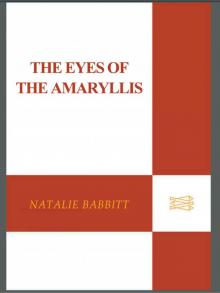 The Eyes of the Amaryllis
The Eyes of the Amaryllis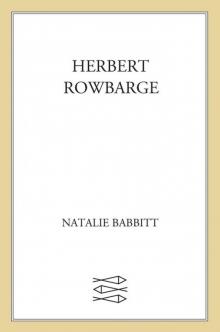 Herbert Rowbarge
Herbert Rowbarge The Search for Delicious
The Search for Delicious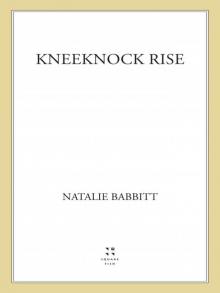 Kneeknock Rise
Kneeknock Rise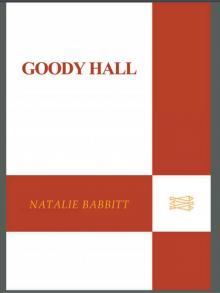 Goody Hall
Goody Hall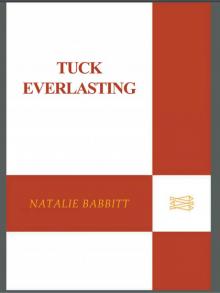 Tuck Everlasting
Tuck Everlasting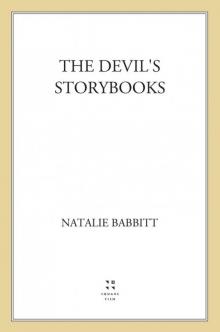 The Devil's Storybook
The Devil's Storybook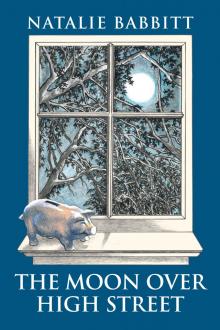 The Moon Over High Street
The Moon Over High Street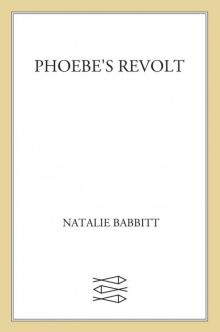 Phoebe's Revolt
Phoebe's Revolt Barking with the Big Dogs
Barking with the Big Dogs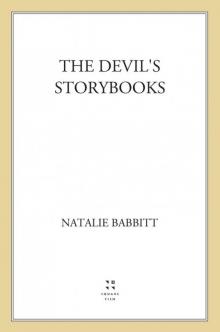 The Devil's Storybooks
The Devil's Storybooks